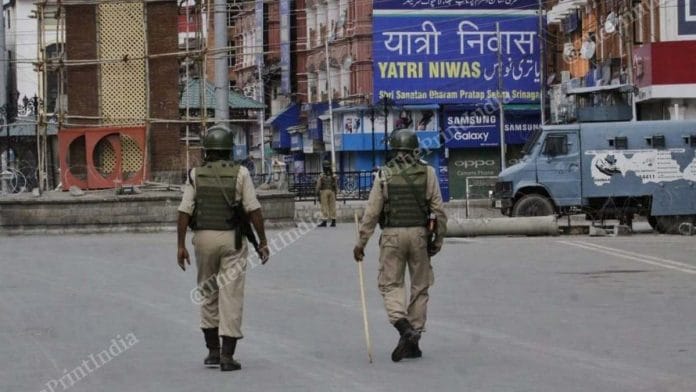Srinagar: A prominent Valley-based rights group has described frequent internet restrictions in Kashmir as a “profound digital apartheid” that deprives residents of the “means to participate in a highly networked and digitised world”.
In a report released Tuesday, the Jammu Kashmir Coalition of Civil Society (JKCCS) termed the communication blackout imposed by the central government last year, ahead of the scrapping of Article 370, as a means of collective punishment.
“Internet shutdowns and restrictions in Kashmir also raise important questions of collective punishment in the context of an ongoing armed conflict, where the framework of international humanitarian laws applies,” the JKCCS said in its report, titled ‘Kashmir’s Internet Siege, an ongoing assault on digital rights‘.
“We argue that, under humanitarian law, prolonged and blanket internet disruptions are similar to other kinds of disproportionate and impermissible forms of targeting or blockading of essential civilian infrastructure or services. The digital siege is constituted by varied forms and phases of network disruptions and shutdowns,” it added.
Based in Srinagar, the JKCCS is led by human rights activist Khurram Parvez.
Jammu and Kashmir was placed under a complete communication blackout, including a ban on mobile calling, last August as part of a government effort to maintain peace following the scrapping of its special status. While most of the restrictions were removed in a phased manner, high-speed mobile internet remains blocked in all of J&K except for two districts — Ganderbal and Udhampur. The two districts were allowed 4G services earlier this month on a trial basis.
Although the current spell is the longest, Kashmir has for years been subject to frequent internet disruptions because of militant activity in the region.
Also Read: Ban on high-speed internet not proving enough to prevent rising violence in Kashmir
‘Health, press freedoms suffer’
In its report, the JKCCS sought to describe how “the digital siege affects the lives of ordinary Kashmiris, resulting in a silencing and erasure of their human rights, opportunities, and aspirations”.
“The siege serves as a deliberate means of severing social, economic and political connections between Kashmiris, while also isolating them from the world. For the already vulnerable people of Jammu & Kashmir, who live amidst a state of perpetual war and permanent emergency, it enacts a ‘digital apartheid’, a form of systemic and pervasive discriminatory treatment and collective punishment,” the 125-page report stated.
The livelihood consequences of the August 2019 shutdown, it states, were severe.
“Losses suffered by various businesses during the first five months alone were estimated at Rs 178.78 billion, with more than 500,000 people having lost their jobs in the Valley in the period,” the report said.
“Health indices showed a marked decline, with the months of June-August 2019 showing numbers of hospital visits dropping by upto 38 per cent. Amidst the internet and telecommunications blackout, more than 6,000 detentions and over 600 ‘administrative’ detentions took place around August 5th 2019. Of habeas corpus petitions filed for the release of illegal detainees during the period, 99 per cent remain pending,” the report added.
Press freedoms and the right to freedom of speech, expression and social participation suffered from the direct impact of online surveillance, profiling and criminal sanctions, the JKCCS said, citing police complaints against journalists and 200 social media and VPN users.
India leads the “world in ordering internet shutdowns, and both in terms of frequency and duration Jammu & Kashmir accounts for more than two-thirds of Indian shutdowns”, the report said. “There have been 226 documented internet shutdowns in Jammu & Kashmir since the year 2012.”
The report also quoted findings from other organisations to talk about the state of internet in the Valley. In one section, the report compared time taken to download Covid-19 guidelines in Delhi and J&K. While the guidelines took 0.24 seconds to download in Delhi at the speed 100 mbps, in Kashmir, the same document took 3600 seconds (1 hour) at 50 kbps.
Also Read: Students in Kashmir attended regular classes for only two weeks in the last one year







Jihadi alert!
The author, like his fellow Muslims, wants to have the right to kill Indian soldiers by planting roadside bombs and they also want to throw stones at everything Indian.
So isolate stone pelters, what is your contribution to enjoy such freedoms?